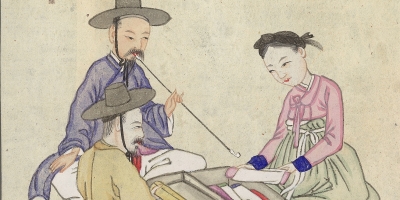
The National Anthropological Archives in the National Museum of Natural History’s Department of Anthropology, collects and preserves historical and contemporary anthropological materials that document the world’s cultures and the history of anthropology. The collections include fieldnotes, journals, manuscripts, correspondence, photographs, maps, artwork, and sound recordings created by Smithsonian and non-Smithsonian anthropologists, Native peoples, and other scholars, scientists, and researchers. Created out of the merger of the Smithsonian Institution’s Bureau of American Ethnology (BAE) and Department of Anthropology (DOA) in 1965, the NAA holds one of the world’s largest and richest archival collections related to North American archeology and ethnography, indigenous artwork, and historical photographs.
The National Anthropological Film Collection (formerly the Human Studies Film Archives) merged with the NAA in 2017. Begun in 1975 as the National Anthropological Film Center, the audiovisual collection which includes some of the classics of visual anthropology, spans the history of filmmaking and documents all regions of the globe. Together with the NAA, these collections are an unparalleled archival resource for world cultures.
Highlights: Established in 1879 as the archives of the Bureau of American Ethnology, the NAA's holdings include ethnological and linguistic documents concerning North American Indians collected by the Smithsonian Institution since the 1850's and by federal geological surveys during the 1870's. George Gibbs, John Wesley Powell, and Franz Boas are among the very many anthropologists who contributed to the collection. Archaeological documents include materials of Cyrus Thomas' survey of mounds east of the Rocky Mountains, periodic reports of the Work Projects Administration, and the records of the River Basin Surveys, as well as materials of individual archaeologists and a collection of so-called "grey" literature. There is also a large photograph collection of original glass film negatives and vintage prints, the largest and best documented collection of 19th-century Plains Indian drawings on paper (including ledger book drawings). There is a small but important collection of sound recordings, including material collected by John P. Harrington, James Henri Howard, and John Lyle Fischer. The NAA also houses over 23,000 items of artwork, most of North American origin produced by native people. More recent acquisitions include documents and photographs concerning cultures in all parts of the world. Collections of surprising richness can be found for virtually all parts of the world.
Researchers will find complementary film, video, sound and photographic collections in the National Anthropological Film Collection.
Highlights: Seminal works of many well-known ethnographic filmmakers, including John Marshall's Ju/'hoan Bushman films, Timothy Asch and Napoleon Chagnon's Yanomami film project, David and Judith MacDougall's Turkana Trilogy, portions of the American University Field Staff Faces of Change Series, and Jorge Preloran's ethnobiography films. Films and footage also include unique historical materials such as Joseph Dixon's footage of the Crow Indians (Montana, 1908s); Matthew Stirling's footage used for By Aeroplane to Pygmyland (West Irian, 1927); Melville J. Herskovits' footage shot in Dahomey, the Gold Coast, and Haiti (1931 and 1934); Aloha Baker's footage of the Bororos (Mato Grosso, Brazil, 1930-1931); and Robert Zingg's footage on the Huichol and Tarahumara (northern Mexico, 1933). Of particular interest is an extensive collection of amateur and professional travel and expedition films which reveal much about both the filmmaker and the subject. The collection also contains a wide range of educational films, documentaries, television broadcasts, and outtakes.
National Anthropological Archives
Museum Support Center
4210 Silver Hill Road
Suitland, Maryland 20746
301.238.1310
301.238.2883 fax